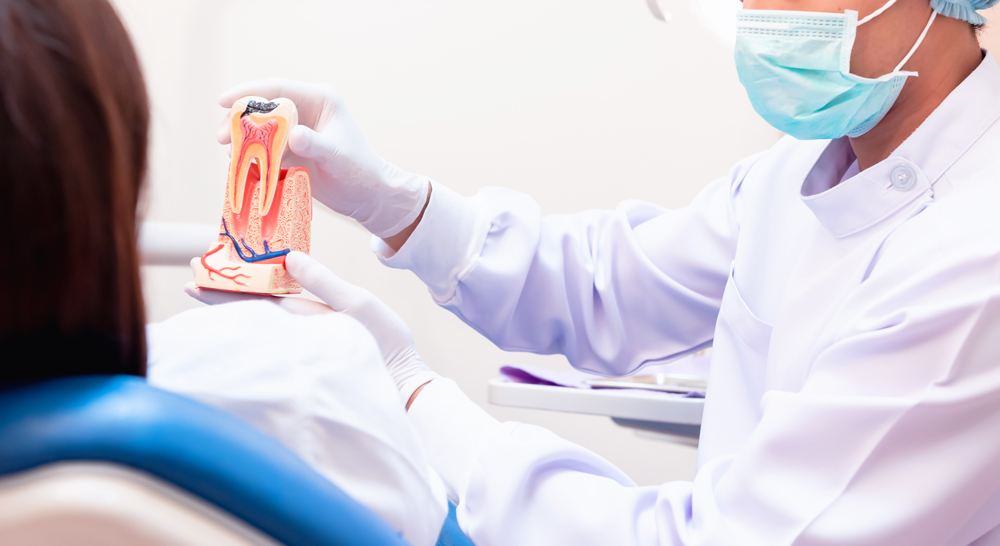Endodontics (Canal Treatment)





Endodontics (Canal Treatment)
Root canal treatment (Endodontics), which is performed to repair and save teeth, is a painless and fast procedure with a high success rate.
Endodontics (Canal Treatment)
The first priority in dental treatments is to protect the person's own teeth. For this, root canal treatment is applied to repair and save a severely decayed or infected tooth.
What is Root Canal Treatment (Endodontia)?
What is Root Canal Treatment (Endodontia)?
Endodontic treatment, also known as root canal treatment, is the process of removing the pulp of a decayed, damaged or infected tooth, sterilizing the tooth and closing it with a filling. The pulp is a soft tissue inside the root canal and its only task in adults is to perform sensory functions such as feeling the sensation of hot and cold.
If the infected or dead pulp is not treated, an abscess may accumulate in the tooth root and jawbone. Accumulating abscess can destroy the bone surrounding the tooth and cause pain. The causes of damage to the pulp are:
- Tooth cracking.
- Progressive deepening caries.
- Damage to the tooth due to impacts.
- Untreated gum disease.
- Damage to teeth due to grinding and chewing habits.
- Progressive bruises under fillings or veneers made due to incorrect treatments.
The recovery rate of teeth with root canal treatment is approximately 90%. For this reason, patients should start their treatment without wasting time.
Symptoms of Conditions Requiring Root Canal Treatment
Symptoms of Conditions Requiring Root Canal Treatment
Some symptoms of conditions that require root canal treatment are as follows:
- Permanent tooth sensitivity to hot and cold.
- Pain when chewing or biting.
- Severe toothache.
- Swelling in the face and neck area.
- Pimple-like scar formations on the gums.
- Swelling in the gums.
- Dark patterns observed in the gums.
- Cracks observed on the tooth surface.
- Deep dental caries.
How is Root Canal Treatment Performed?
How is Root Canal Treatment Performed?
Root canal treatment is a treatment method that may take one or two sessions depending on the condition of the damaged tooth. Although the procedure followed in root canal treatment varies according to the current condition of the tooth to be treated, the following steps are generally followed:
- First of all, a dental x-ray is taken and the dentist examines the root structure of the tooth and signs of infection, evaluates the tooth damage and gives approval for the application of root canal treatment.
- If the existing damage to the dental pulp is excessive, root canal treatment is started.
- The dental pulp is carefully removed and the processing time is determined.
- Root canals are reshaped and sterilized by the dentist.
- After successful treatment, the canal is filled with a permanent material in order to prevent the canals from being affected by contamination.
- The filling process is made of dental paste and a rubber-based substance called gutta percha. Thanks to this process, any possible leakage into the root canal from the outside is prevented.
Things to Consider After Root Canal Treatment (Endodontia)
Things to Consider After Root Canal Treatment (Endodontia)
There are a few general recommendations that patients should follow after root canal treatment. Apart from these recommendations, your doctor who performs the procedure may also give you different recommendations depending on your situation.
- After the treatment, nothing should be consumed for approximately 2-3 hours.
- Hard or crusty foods should not be consumed until full healing is achieved in order not to apply pressure on the treated tooth.
- Consumption of foods that are sticky and contain sugar after the treatment should be avoided.
- If the use of drugs is recommended by the dentist, the drugs should be used as per instructions.
- Extremely hot and extremely cold drinks should be avoided for 1-2 days as there may be sensitivity in the treated tooth.
- Tooth cleaning should be done twice a day using a brush (with a soft bristle structure) and once a dental floss.
Teeth with root canal treatment can be used for life if necessary care is taken. The success rates in treatment are quite high and early diagnosis is very effective for the procedure to be successful. For this, it is very important for your oral and dental health to regularly check with your dentist twice a year.
Would you like to book an appointment?
Book Appointment





